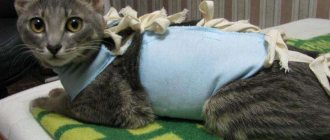Many owners of furry pets keep cats not only as pets, but also as assistants in the fight against rodents. This is why most owners are afraid to sterilize their animals, fearing that after the operation they will lose their hunting instinct. Whether such a statement has any basis or can be perceived as a myth, let’s try to figure it out.
What are the “pros” and “cons” of castration/sterilization in cats?
Pros:
- calmer character, reduced aggression;
- elimination of most behavioral problems;
- lack of “tags”;
- reducing the risk of uterine cancer, disruption of the correct functioning of the mammary glands, ovaries;
- the cat does not rush outside, does not bother the owner with loud cries;
- the problem of “addition” of unplanned offspring does not arise.
Minuses:
- there is a minimal risk of complications (but under the supervision of an experienced veterinarian this probability is almost zero);
- the effect of anesthesia can be dangerous for elderly animals and those suffering from cardiovascular diseases (you must consult a veterinarian);
- with an incorrectly selected diet, the likelihood of obesity increases (if you do not limit your pet’s food intake);
You can avoid these disadvantages after surgery as follows:
- consult a veterinarian and conduct a preliminary examination of the animal;
- show maximum care and attention after medical intervention;
- provide the animal with specially selected food;
- do not overfeed the animal.
I would like to warn against using drugs to reduce sexual desire in animals instead of sterilization/castration. Very often, such drugs trigger extremely negative processes in the body, resulting in tumors and urolithiasis.
Please note that if a cat was indifferent to rodents before castration/sterilization, then after the operation they will not show interest in them. But if your pet proudly brought you his trophies, then even after medical intervention he will delight you with his achievements. Perhaps he will take a break of several days for complete recovery.
Was the article useful? Tell your friends what you read
According to veterinarians, a sterilized cat or neutered cat will not lose its hunting instincts, and therefore will continue to hunt rodents. Changes in character are possible, but there is no need to be afraid of drastic changes or increased laziness. To ensure that the medical procedure does not harm your pet, it is important to monitor the diet, follow the recommendations of veterinarians after surgery, and pay increased attention to the recovering animal.
Gender question
Cat or cat? Which one is the best hunter? If you need to choose an animal to catch rodents based on gender, then the answer is obvious - it’s a cat. By nature, she must obtain food for her cubs. And cats are looking for someone to conceive. Although if they are castrated, they begin to hunt more productively.
Experts do not recommend keeping two cats on a farm at once without castration. They will be constantly busy dividing the territory. Hunting will not bother them.
A cat that has undergone sterilization is much more effective at catching mice in the yard and in the house. But there is a minus here - she is deprived of the opportunity to bear children, that is, new generations of hunters.
Pros and cons of sterilization
Using pills to reduce sexual desire instead of surgery is dangerous for the animal. The consequence of the use of drugs is the development of cancer and urolithiasis.
Properly carried out sterilization of a cat can have the following positive and negative consequences for the pet, presented in the table:
| pros | Minuses |
| Reducing the likelihood of malignant tumors in the genitals | Risk of death from acute allergic reaction to anesthetic drugs |
| Lack of estrus and search for a sexual partner in the spring | Obesity due to poor diet |
| Eliminating the risk of pregnancy | The appearance of laziness during unorganized leisure time |
| Stabilization of hormonal levels | Temporary increase in nervousness |
| Improvement of character | Developing picky eating habits |
| Frequently keeping the pet in the house, and not on dangerous walks around the city | Risk of aggressive outbursts towards other pets |
According to veterinarians, the risk of side effects is minimized if the pet owner adheres to the following recommendations:
For good health after the intervention, the animal must have the opportunity to play.
- Ensuring proper diet. Neutered cats eat special food that does not cause obesity or the development of urolithiasis. A mixed diet, including foods from the table, is contraindicated because it negatively affects the animal’s metabolism.
- Active games. Catching mice from your pet cannot be the only active activity. The cat should have the opportunity to frolic with toys and run around in open space.
- Affection and attention. If signs of depression or nervousness appear, you should consult a veterinary clinic and reduce stress factors. It is possible to take sedatives.
Will a cat catch mice?
You can castrate a cat without fear of losing hunting skills. During the period after sterilization, the pet will be apathetic due to severe stress, but later it will return to its usual lifestyle. The desire to catch rats, mice, reptiles, insects is due to natural instincts, the desire to play, to spend energy.
If a cat, who was a hunter before surgery, loses interest in an active lifestyle and begins to gain weight, it will be necessary to review the diet, reduce food portions, and avoid giving contraindicated foods.
According to the observations of cat owners, after sterilization, pets hunt more actively and take more killed animals into the house for the sake of receiving praise. A healthy animal spends the forces that went into satisfying sexual desire in a different direction. It is foolish to expect that a cat who was not interested in hunting before surgery will actively catch mice after castration. Sterilization does not affect the animal's habits in any way. When choosing a pet for a specific purpose - catching mice, you need to focus on its individual character.
Once you decide to get a pet, you need to understand the pros and cons. Place of residence plays an important role in choosing the breed of an animal. Most private sector owners prefer cats not only from an aesthetic, but also from a practical point of view, since these pets are the best weapon in the fight against rodents.
Nutrition question
A hunting cat needs to be fed. She will have the strength to hunt. Moreover, it is not always possible to get a trophy. The cat enjoys the hunting process itself. And only wild and street people eat mice. Also, a hungry cat is more nervous, in a hurry and in many cases misses the mouse. And she will not live long with her stingy owners. He will find a more convenient place in this regard. She becomes attached to a warm home, where she will always be fed. And hunting for her is comparable to entertainment.
Cats often bring their hunting trophies to their doorstep. This is their sign of gratitude to the owners. It's not worth reproaching her for this. Just discreetly throw away the dead mouse.
Often cats bring not only mice, but also frogs, snakes and any things that they like in appearance or smell. In some cases, these may be items of clothing or underwear. Moreover, the cat only carries clean things. Dirty ones - she disdains to take them in her teeth.
If your cat caught a mouse, here are the following options for its subsequent actions::
- She will kill her and leave her on the street.
- He will kill and eat.
- Will kill and bring the mouse into your home.
- He won’t kill, he’ll play and let him go.
One way or another, it is necessary to observe certain hygienic and preventive criteria in order to protect your predator from health problems.
To be or not to be castration
Sooner or later, owners are faced with the choice of whether to castrate their cat in order to eliminate the possibility of constant or occasional “March” sprees. Almost all cats mark their territory for a number of reasons, which is often the basis for the decision to castrate the animal.
To avoid your neighbor’s cats having offspring from your cat, you should take care to timely castrate your pet. The best option for carrying out such operations is considered to be a return of eight to nine months. During this period, the cat had not yet had time to go “fornication”, and, therefore, had not acquired the skills to mark the territory entrusted to him. The operation can also be performed at older ages.
Some owners prefer more gentle methods of dealing with seasonal surges in hormonal levels in cats, giving their pet special medications, for example, “Stop Intim”. In fact, this is not the best option for solving the problem, since such a drug will have to be given at certain intervals, and abuse can lead to the appearance of various diseases and even the formation of tumors.
Almost any cat can be castrated, if it is not a prize-winner of exhibitions and, therefore, an eligible bachelor, with glamorous cats on the waiting list for the year ahead. All other pets can be safely sent for the procedure if there are no other contraindications.
Myths about castration
Before discussing the advantages and disadvantages of the procedure, you should understand how to correctly understand such formulations as castration and sterilization. There is a misconception that cats are castrated and cats are sterilized. Actually this is not true. Both male and female cats can be neutered, which means removing the uterus and ovaries of the female cat, and the removal of the testicles of the female cat. But during sterilization, only ligation of the spermatic cords in cats and the fallopian tubes in cats is carried out.
The second procedure is considered more loyal to the animal. After all, the recovery process in this case is much painless and faster. Already on the second or third day after the operation, the animal feels normal and leads the same lifestyle as before the operation.
Will a cat catch mice after sterilization or not?
Sterilization (or castration) is a popular veterinary procedure in urban areas. Sooner or later, when cats are in heat, they cause a lot of inconvenience to their owners. They scream loudly and become active at night, turning the apartment upside down. Of course, the main problem for the owner will be unplanned kittens.
Before deciding on the important step of sterilization, it is worth dispelling misconceptions on the topic of whether neutered cats catch mice?
Differences from sterilization
Let's turn to the definitions to clarify once and for all that these are two completely different concepts. Castration is the removal of a cat's testicles or the uterus and ovaries of a cat. Sterilization is the ligation of the spermatic cords in a cat or the fallopian tubes in cats.
The main idea of sterilization is to make the animal infertile, eliminating unwanted offspring. Although at the same time they use a medicinal method, when the cat’s activity decreases for a certain time.
Castration is aimed at permanently reducing the animal’s hormonal levels. Let us note that in cats, it is the sex enzymes that are responsible for aggressiveness, marking territory or vagrancy.
Hunting
Of course, for apartment residents the issue is not so pressing. But for owners of dachas or private houses, the question arises bluntly. It is difficult to control a conditionally street animal, which in fact only comes home for food and affection.
There is an opinion that after castration the animal becomes calmer and more indifferent to hunting. Allegedly, a decrease in testosterone affects the behavioral functions of the pet. But this opinion is wrong - a decrease in hormonal levels cannot greatly influence the skills inherent genetically.
Determining factors
If the cat has not previously shown interest in catching mice, no castration will affect its activity. Unfortunately, if an animal is not inquisitive even in childhood, then it is quite difficult to accustom it to active games.
In addition, cats become lazy if they eat regularly. Why get your own food when a good owner will feed you anyway? This does not mean that you need to keep your pet on a ration. You should:
- Monitor your diet . Stick to approximately the same time frame for breakfast, lunch and dinner, and do not spoil yourself with handouts from the table.
- Don't give in to provocations . Especially apartment cats are cunning beggars. Be strict. This will help the pet.
- Take your pet out into nature. No matter how big the apartment is, nothing can replace natural lands for a cat. Take him for a walk with a leash or let him go into the garden if you have a village or cottage.
The latter will greatly help in terms of animal activity. Nowadays, even a stray cat can find food in any trash can. Hunting is used as a last resort. Of course, a cat will not disdain a mouse or a pigeon, but it is much easier to examine garbage bags.
Castration can lead to obesity in your pet. The hormonal background changes noticeably, which leads to a slowdown in metabolism and laziness. If you allow overfeeding during such a difficult period, then of course the cat will not catch mice.
Make sure your cat has constant access to drinking water. This will also be able to normalize body weight and maintain hunting skills (provided that the animal has been active and inquisitive since childhood).
Castration leads to a loss of playfulness. More often than not, this is completely false. Many owners are convinced from personal experience that their pet becomes more obedient and sociable. A cat may get angry or mischievous at its favorite toys, but one way or another they calm down and return to their usual animal activities.
Misconceptions
Misconception No. 1 - Castration is a dangerous operation that is poorly tolerated by cats.
Modern medicine has accumulated enough experience to make castration a common, even routine operation. There is a huge demand among veterinarians, which made it possible to protect the animal as much as possible during the operation. Here are just a few types that modern doctors can offer:
- Standard castration . A scalpel and anesthetics are used. A classic and cheap operation that does not require huge investments.
- Castration using cautery . For the operation, a special surgical instrument is used to cauterize tissue. The advantage will be the absence of blood, an even seam. A thread is also used at the adhesion site to secure the wound.
- Laparoscopy . For the operation, a telescopic tube with a lens system is used, which is inserted through a small hole (up to 1.5 cm in diameter). The most advanced and expensive method that does not leave unsightly scars on your pet’s body.
Misconception #2 - The cat will look unnatural and constantly feel unwell after sterilization.
Undoubtedly, in the first weeks after surgery, decreased activity and drowsiness are possible. The pet will be mischievous and may not make contact. This is normal post-operative behavior. The rehabilitation period can take up to several weeks, but with proper care the cat will quickly return to normal.
You should not abuse your attention so as not to injure the animal after castration. If the owner is embarrassed by the inevitable defects after surgery, then a good pet clinic can order cosmetic corrections. For example, silicone implant.
Misconception No. 3 - After castration, a cat will stop being sociable and will not hunt.
Sterilization will not affect your pet's genetic predisposition in any way. It doesn’t matter whether the operation was performed or not, hunting skills depend on the pet itself and its activity.
The owner can partially influence the cat in a playful way by simulating hunting. Toys, running for a laser pointer or candy wrappers will help here. You can provoke the cat a little, let him bite your hand. Small active children will be a special advantage.
Misconception #4 - A cat must mate before castration, otherwise the operation will greatly affect its health.
Mating for a cat is primarily stressful. This needs to be taken into account. The first mating will lead to hormonal changes in the body. But after castration there will be no physical opportunity to mate.
The second wave of stress for the pet will pass, which will definitely affect its health. In addition, promiscuous relationships will not lead to anything good. It is very difficult to keep a cat that has already mated from going out again, especially in a private home/dacha.
Misconception #5 - You can sterilize a cat at any age.
Pets over eight years of age should undergo surgery only if they have serious cancer or chronic diseases. For older individuals, such an operation will bring a lot of inconvenience due to hormonal problems. In such cases, castration with medication is used.
It is much easier to undergo surgery on young, healthy animals. The procedure will not have the same effect on character and behavior, and the sterilized cat will return to hunting mice.
Behavior change
There are often cases when cats behave quite aggressively towards household members and guests. Pets are capable of not only scratching furniture, but also attacking. The animal experiences a kind of stress (usually due to dissatisfaction). This behavior goes from episodic to permanent status, since the pet considers it the norm.
The problem can be solved if the animal is sterilized in a timely manner. The cat becomes more accommodating because the source of “indignation” ceases to be relevant. If even several months after the operation the cat still continues to be mischievous, then the cause should be sought in other factors (constant stress, illness, lack of attention, etc.). In the first days after the operation, the animal may behave too calmly. It will seem that in such a short period of time the pet's activity will decrease significantly. But actually it is not. The rehabilitation period for each individual is different. For some, a couple of days are enough to recover, while for others it takes up to several weeks or even months.
The main thing is to provide your pet with complete care. This applies not only to nutrition, but also to attention. After all, the animal needs the support of its owner more than ever. It is important to find that “golden” mean that will be optimal for creating a postoperative environment for a cat.
Why is sterilization necessary?
Sterilization of pets is an important issue for every owner.
Sooner or later, every owner thinks about sterilizing their pet, especially when the animals begin their mating season . Cats during heat behave restlessly, do not allow the owner to sleep at night, meow loudly and disappear on the street for a long time. But what is most unpleasant for the owner is the appearance of unplanned kittens, which he simply does not know where to place. After all, as a rule, cats give birth two or even three times a year.
The best way out of this situation can only be sterilization of the animal.
This operation is considered simple and usually the cat recovers within a few days and returns to its normal lifestyle.
When to sterilize without harming psychological health
It is advisable to perform the operation before the animal reaches old age.
It is advisable to carry out such an operation as soon as the cat reaches sexual maturity, no earlier than she is eight to ten months old. Older animals tolerate anesthesia much harder and the rehabilitation period for older cats can take several months.
Drugs that reduce libido
Sometimes pet owners prefer drugs that reduce sexual activity to sterilization.
drugs that reduce sexual desire during the mating season . This is an extremely undesirable alternative, since over time such tablets can cause the development of tumors and other diseases.
Positive and negative sides of sterilization
Like any surgical intervention, sterilization has both pros and cons.
- The cat does not experience hormonal surges, and it becomes more flexible and balanced.
- The operation significantly reduces the risk of such dangerous diseases as cancer of the uterus, ovaries and mammary glands.
The operation allows the cat to avoid many dangerous ailments.
After sterilizing your cat, you can forget about worries and the question of “where to place all the kittens.”
- Some animals are allergic to anesthesia and in rare cases, a cat may not wake up after being euthanized.
In rare cases, a cat may not wake up from anesthesia.
Aggression in cats is a common side effect after surgery.
It should be remembered that for an animal any operation is stressful, so during this period the cat needs the care and attention of the owner more than ever.
Nutrition
There is no need to change anything in your cat’s diet after castration. Everything that the pet liked to eat before the operation should also be given to him after. There should not be any significant weight gain. However, you should be extremely careful and vigilant, avoiding too much fat accumulation. This can happen because the cat will become less active and all the food eaten will simply be deposited in the animal as additional ballast.
If suddenly the cat begins to gain weight after castration, then you should reconsider its menu. If necessary, you should switch to a special food for castrated cats, which balances all the elements necessary for the animal’s full functioning.
As for fish, this product should be given to cats only in heat-treated form - boiled or baked. If you add fish to your diet, then it must be sea fish.
Important: The serving size should be adequate and no more than once a week.
Benefits of castration
To some, it may not seem entirely humane to deprive a cat of the joy of having offspring. However, do not forget that in the fight for the main prize (a kitty), the pet may receive serious injury, which in the future can lead to infection and various ailments. Experts confirm the fact that:
- a castrated cat behaves calmer during the period of sexual desire;
- due to the absence of constant or occasional fights for territory or a female, the cat does not risk being infected with any infection, which has a beneficial effect on life expectancy;
- weekly sprees are excluded;
- the home will stop smelling like cat spirit (an unsterilized pet will not stop doing this at any price);
- the absence of unplanned offspring will prevent the army of homeless animals from being replenished with new individuals. Humanity in this option is more preferable.
Flaws
Despite the listed “advantages”, castration still has a number of “disadvantages”, namely:
- in rare cases, a pet may not wake up after anesthesia due to an allergic reaction to the medication;
- after surgery, the animal becomes lazy and, as a result, gains excess weight;
- The cat's character may change. He may become nervous and moody;
- castration can affect the psyche, causing aggression towards other pets in the house.
Hunting
Of course, for apartment residents the issue is not so pressing. But for owners of dachas or private houses, the question arises bluntly. It is difficult to control a conditionally street animal, which in fact only comes home for food and affection.
There is an opinion that after castration the animal becomes calmer and more indifferent to hunting. Allegedly, a decrease in testosterone affects the behavioral functions of the pet. But this opinion is wrong - a decrease in hormonal levels cannot greatly influence the skills inherent genetically.











